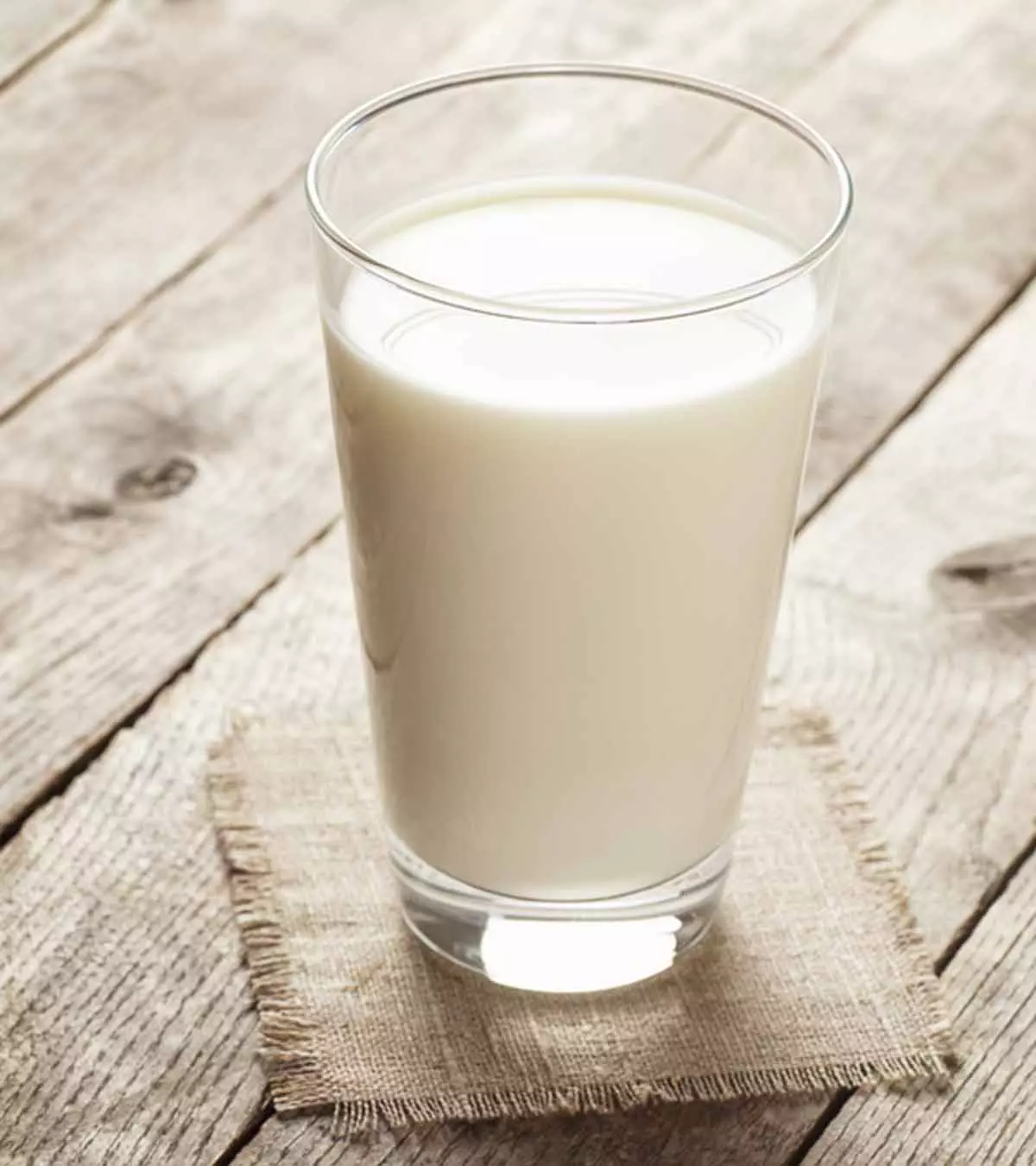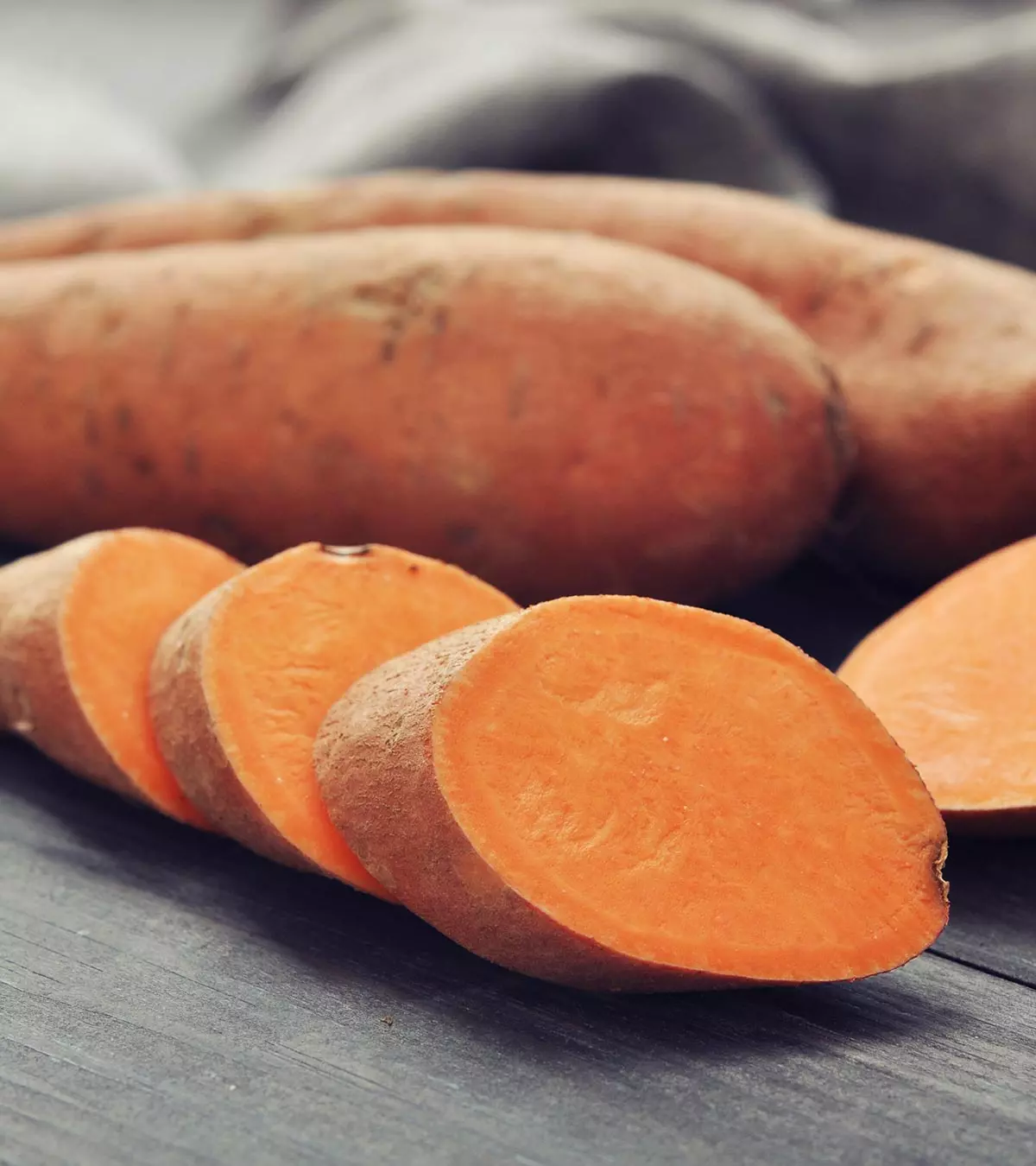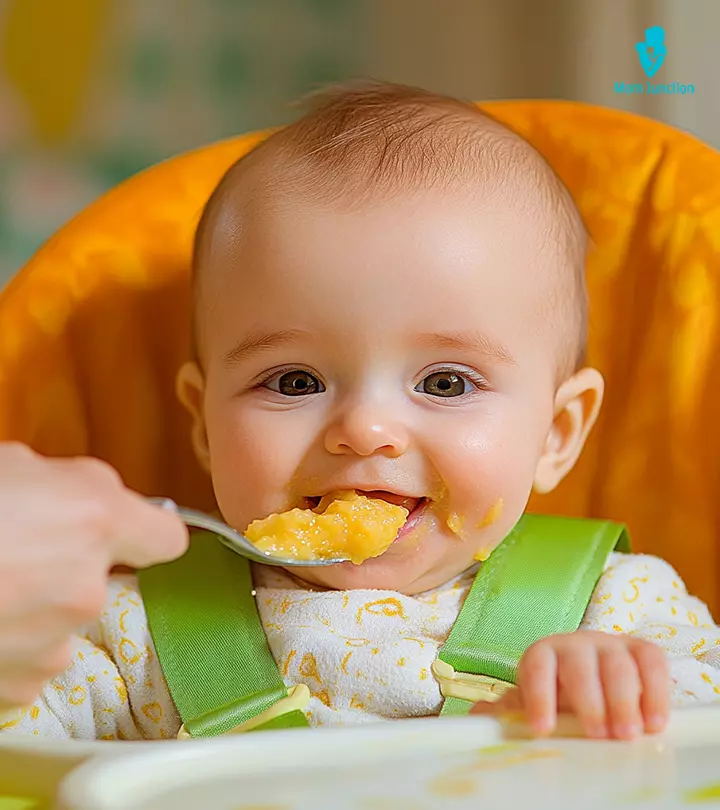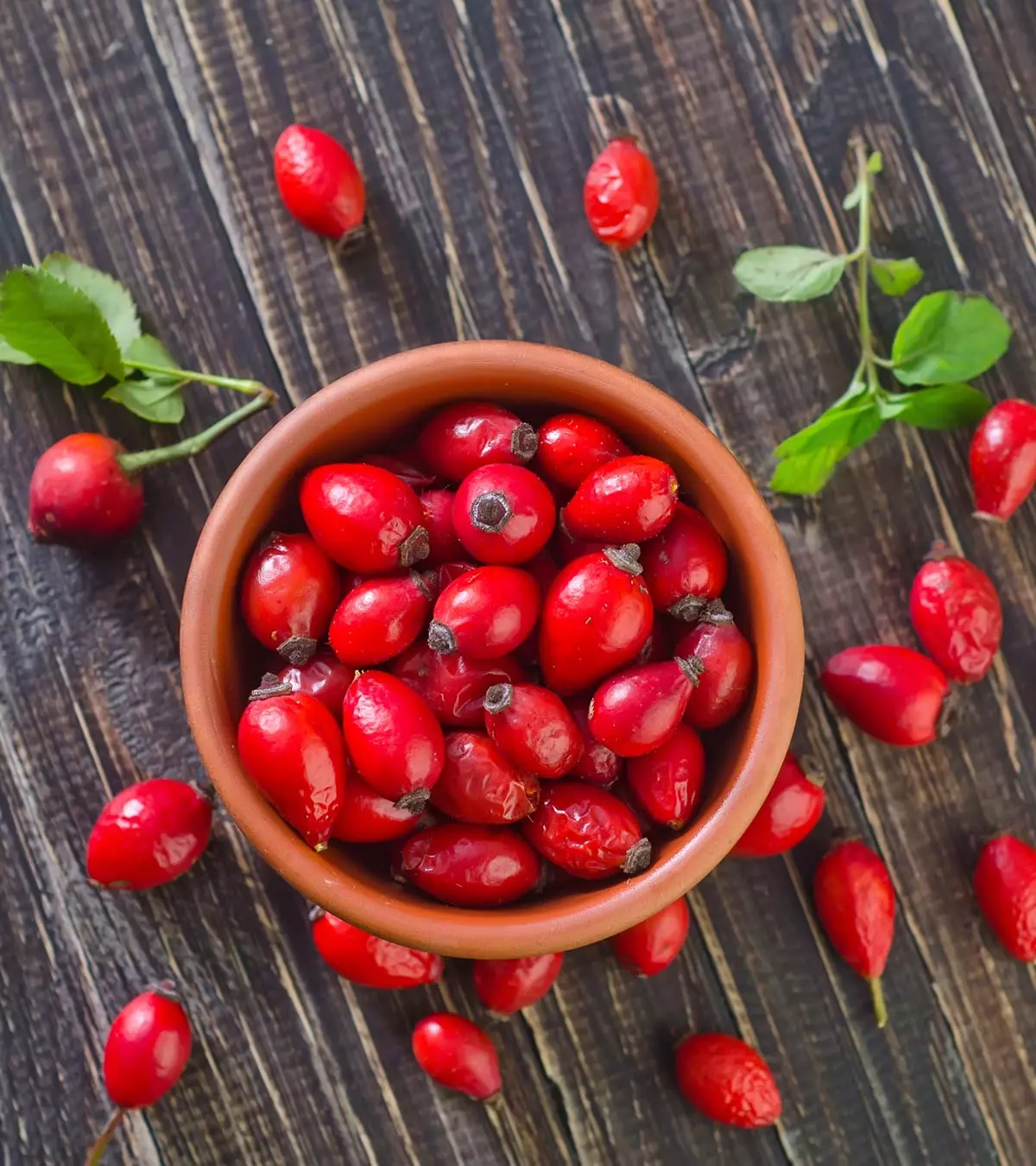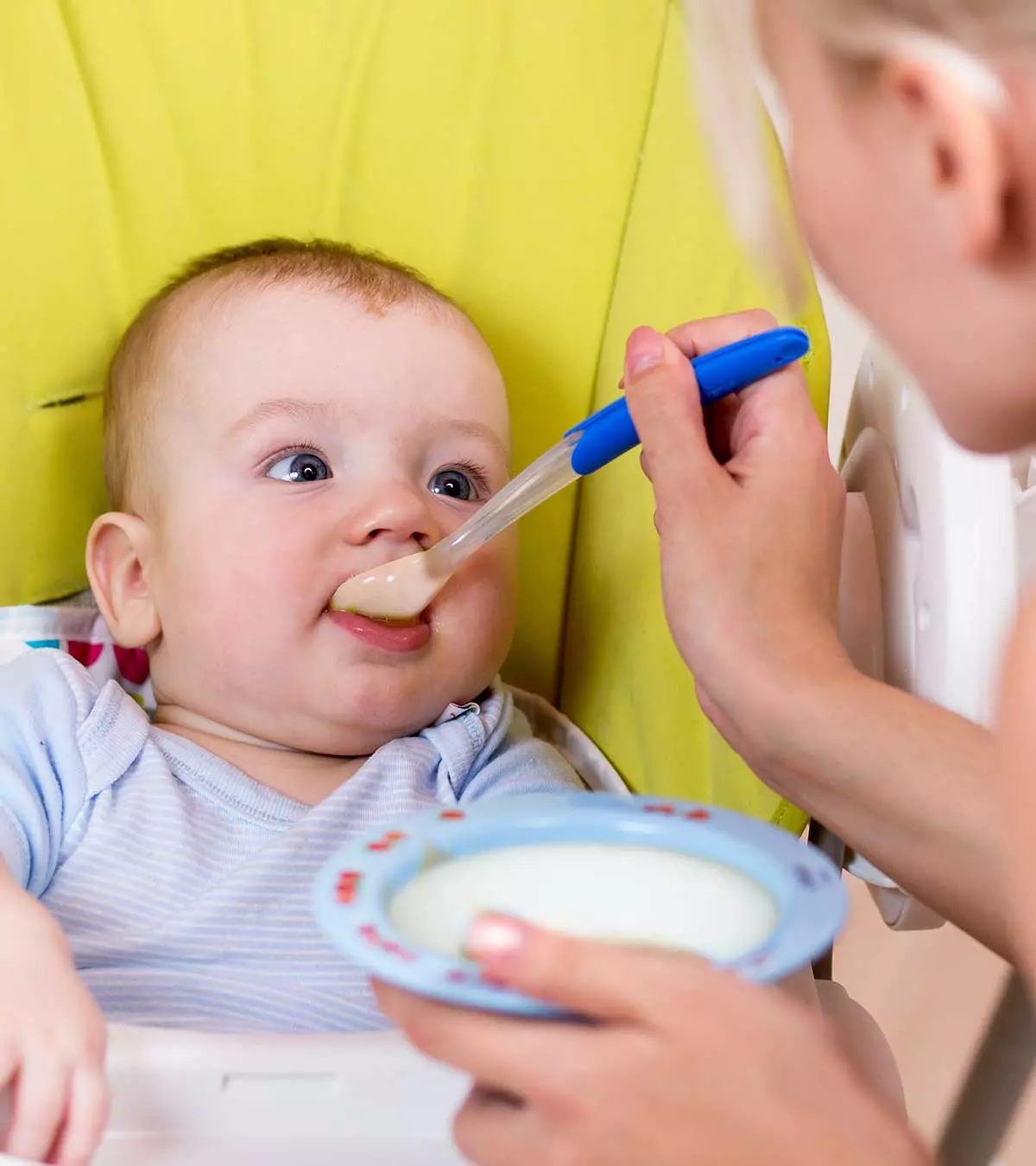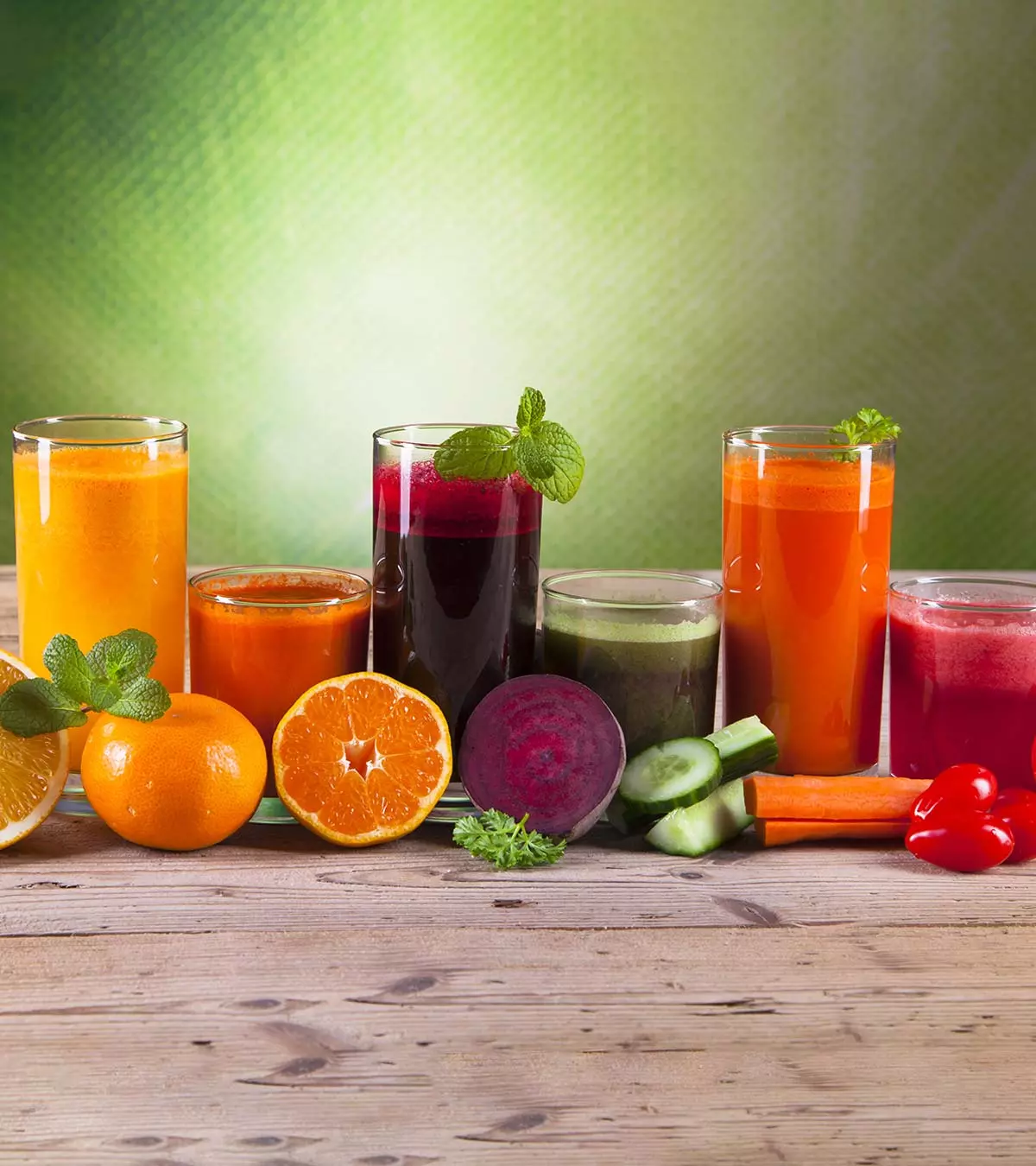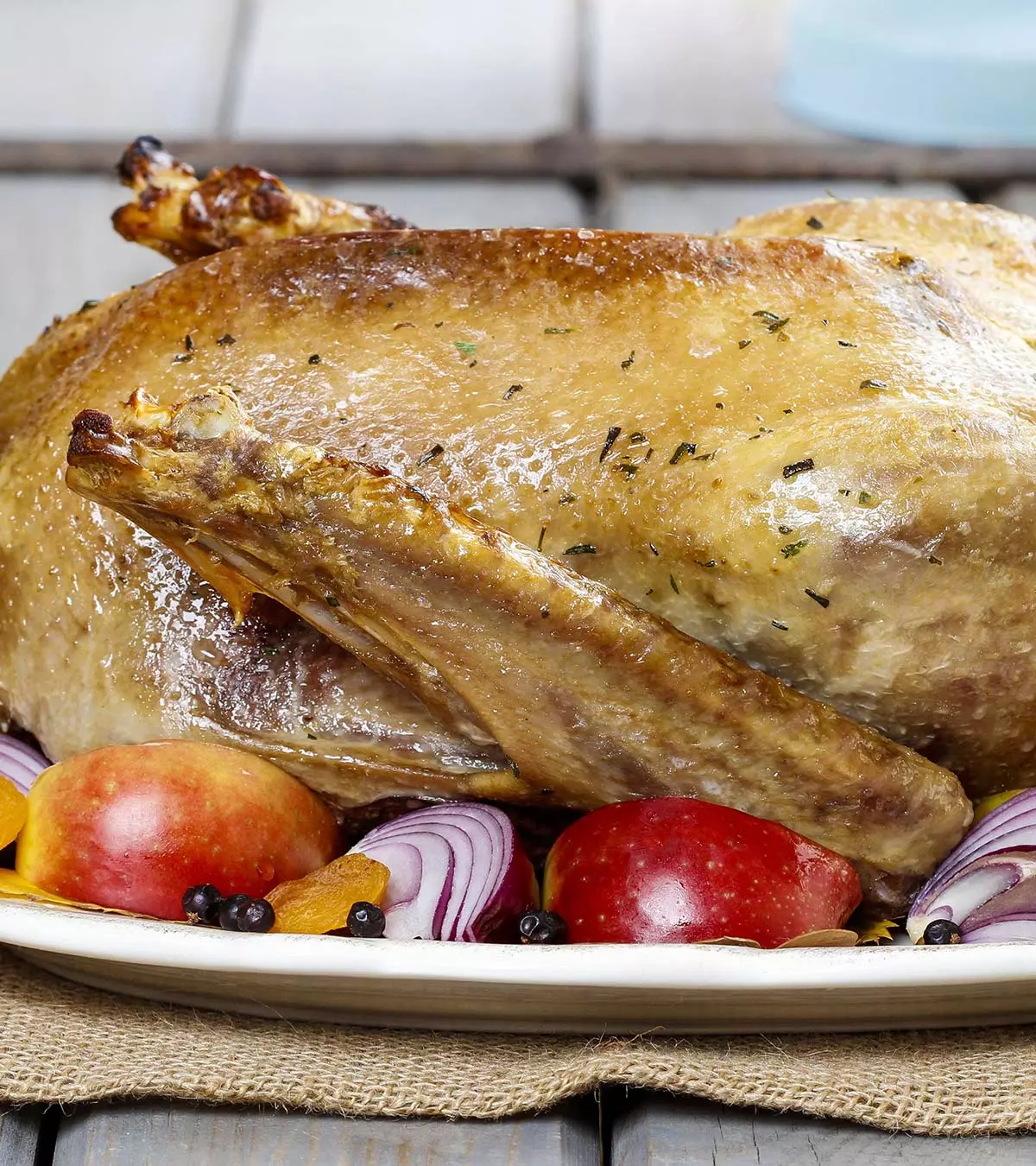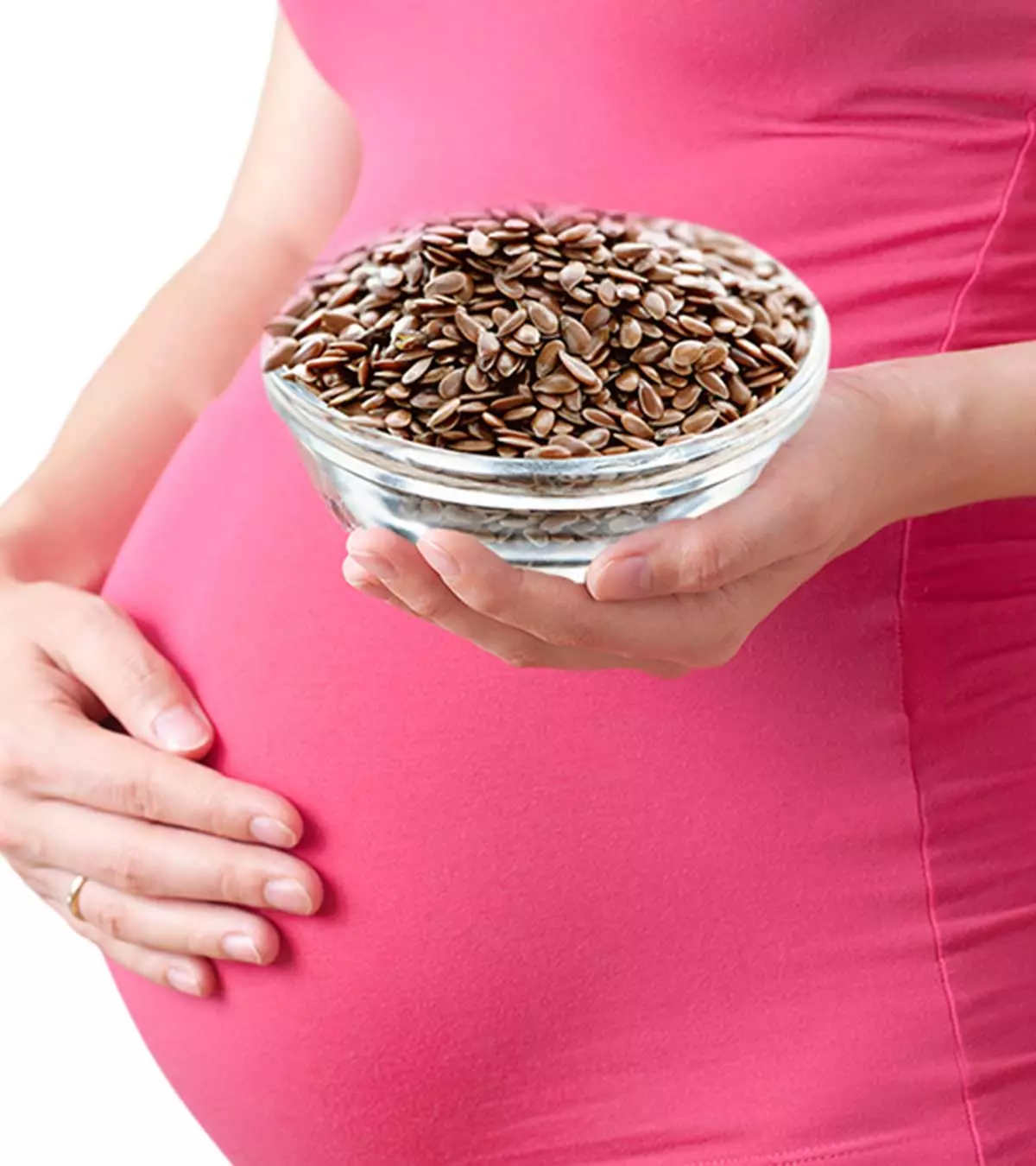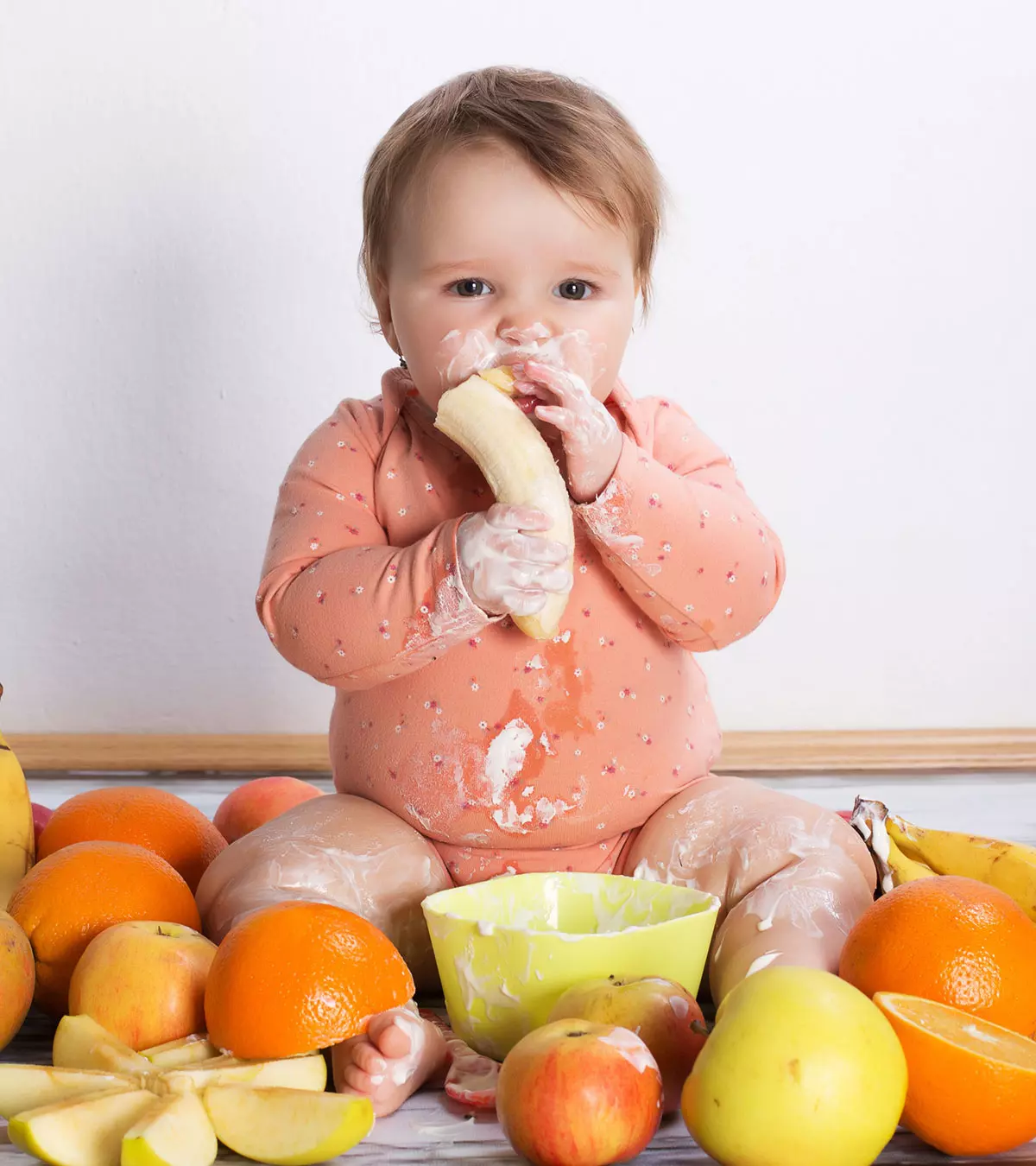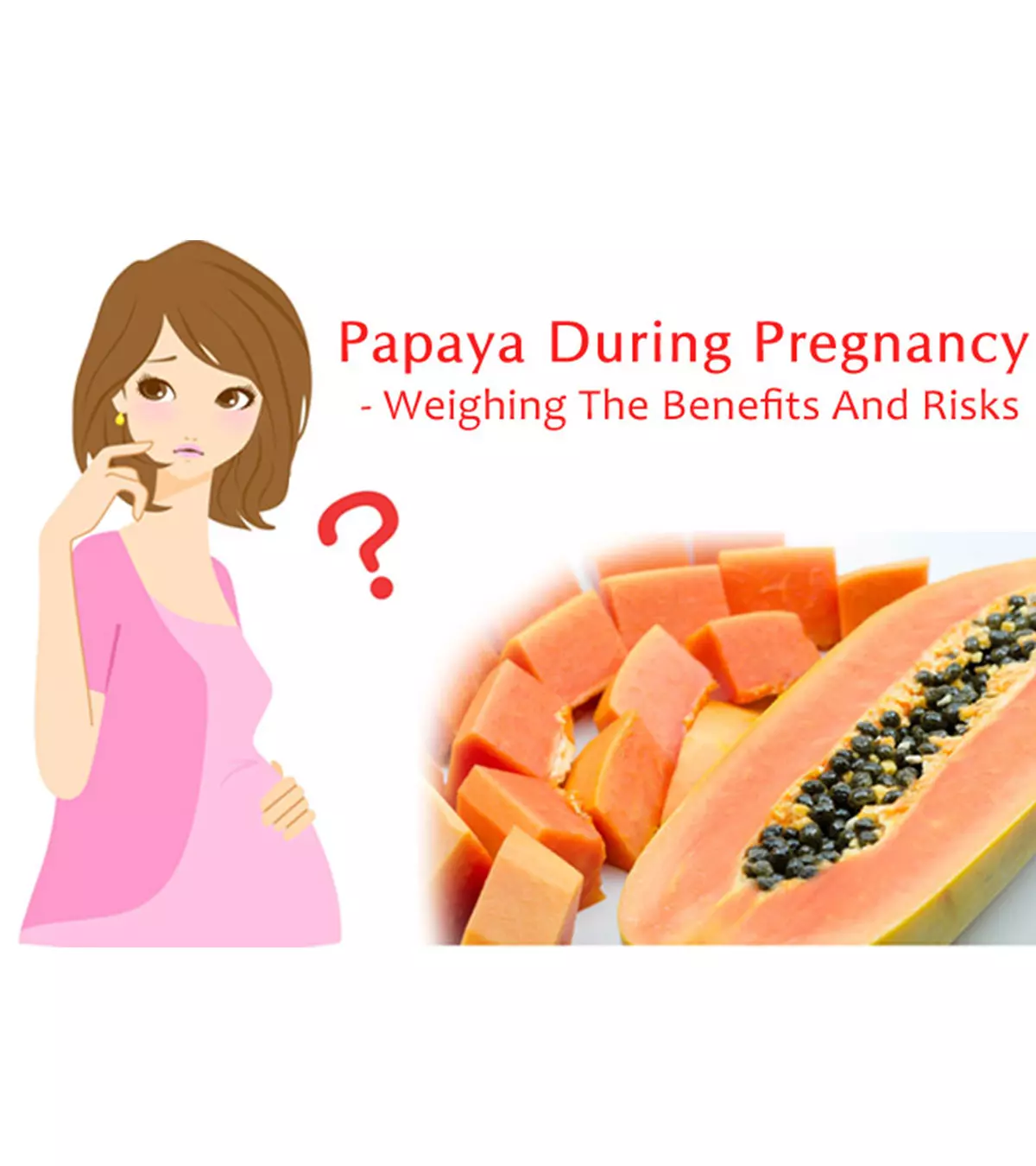
Image: Shutterstock

While some foods may be healthy for you during pregnancy, others might be unhealthy. Hence, if you wish to know if eating papaya during pregnancy is safe for you, this post is for you.
Papaya is high in nutrients and is known to promote digestive health, but most pregnant women are unsure whether or not to add papaya into their maternal diet. In this post, we discuss the safety, benefits, and side effects of eating papaya when pregnant. Read on.
Key Pointers
- Consuming moderate amounts of fully ripe papaya during pregnancy is generally considered safe.
- Ripe papaya is high in nutrients such as antioxidants, vitamins, minerals, iron, and folic acid.
- Raw papaya is not advisable for consumption during pregnancy as it contains latex, which may adversely affect fetal health, cause uterine contractions, bleeding, and pregnancy loss.
- Papaya should be avoided during pregnancy under certain conditions, such as allergies to latex, infertility treatment, and history of miscarriages or abortions.
Is It Safe To Eat Papaya During Pregnancy?
Papaya may be one of your prenatal food cravings and you’re wondering if you can consume it. The answer is yes, it is safe as long as you are consuming ripe papaya in moderate quantities. But semi-ripe and unripe papaya may cause complications in pregnant women. Raw papaya is high in latex, a substance responsible for uterine contractions (1). Hence, doctors do not recommend consuming the green fruit as it may lead to adverse effects on expecting mothers.
You should be careful about what you are eating during pregnancy, especially in the first and third trimester as these are considered crucial stages.
Hannah Whittaker, a pediatric and pregnancy dietitian from Liverpool, England, says, “There is varying evidence to state that unripened papaya may cause uterine contractions; therefore, I would not recommend raw papaya throughout pregnancy. However, ripened papaya can be eaten in moderation.”
Can Papaya Cause Miscarriage In Early Pregnancy?

Image: Shutterstock
An unripe and semi-ripe form of the fruit might increase the risk of miscarriage. The risk is high during the early stages of pregnancy as the latex in the fruit might trigger unnatural contractions leading to miscarriage.
 Research finds
Research findsCan You Have Papaya In Pregnancy Third Trimester?
Avoid raw papaya in the third trimester. The latex in it could stimulate hormones responsible for contractions. Furthermore, eating green papaya might lead to hemorrhaging and bleeding from the corners of the placenta (2). Therefore, unripe papaya is not recommended during the last months of pregnancy.
Why Should You Avoid Latex In Papaya?
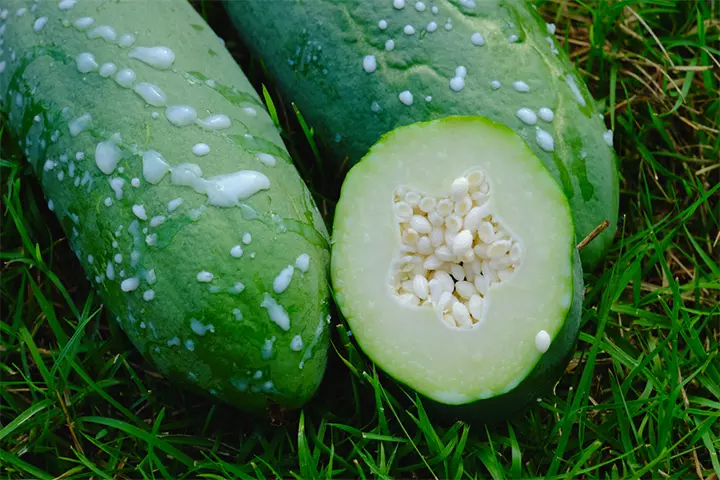
Image: Shutterstock
Latex (the milky liquid) is a mixture of papain, endopeptidases, and chymopapain (3). This substance is considered unsafe because:
- The enzyme papain is known to stimulate contractions that can cause abortion (4). Also, it hinders the production of progesteroneiHormone produced in the ovaries that plays a vital role in pregnancy. hormone, which is significant for a healthy pregnancy.
- Latex acts like oxytociniHormone that facilitates childbirth. and prostaglandiniPhysiologically active substance that encourages the cervix to soften and stretch in preparation for childbirth. , the hormones that could start labor (5).
Latex is found in unripe and semi-ripe papaya, and also in the leaves of the fruit. Hence, try to avoid unripe or semi-ripe papaya throughout your pregnancy.
But the proportion of latex diminishes as the fruit ripens and hence, the ripe fruit can be eaten to enjoy its goodness.
Nutrients In Papaya (Ripe)
The ripe papayas are rich nutrients, including:
- Antioxidants such as vitamin A carotenoids
- Minerals such as potassium (6)
- Vitamins
- Iron
- Calories
- Folic acid (7) Although ripe papaya is good for pregnancy, there are conditions when you should avoid it.
A blogger from China opines, “When we visit Mexico, my Mexican mom often gives us a fruit shake, orangish, and with, from my opinion, a little bit funny smell. I grew up in central China and had never eaten papaya before I went to Mexico. I have to admit that I didn’t really like too much of its taste and had to drink it totally for politeness. But I was told it is a really healthy fruit, so I did some research on it, and it turns out to be true: papaya is a power food, and you should eat it. I have been getting more used to the flavor: sweet, juicy, and it is not all that bad (i).”
 Quick fact
Quick factWhen Not To Eat Papaya During Pregnancy?
The doctor may advise you not to consume the fruit during pregnancy, if:
- you have allergies to latex (8)
- you have gone through any infertility treatment and are conceiving after a long time
- you had a miscarriage, abortion, premature delivery, or such concerns previously.
Also, as mentioned earlier, you should avoid raw papaya as it might lead to some adverse effects.
Effects Of Eating Papaya During Pregnancy
Unripe and semi-ripe papayas are not recommended for pregnant women due to potential risks to maternal health for the following reasons.
- Can be harmful to the fetus development: TeratogeniciChemicals, drugs, or infections that cause defects in the embryo. enzymes can be harmful for fetal development. And papaya contains two of them – chymopapain and papain. Women having a history of miscarriages and abortions should stay away from unripe papaya.

Image: Shutterstock
- May cause edema: Eating several pieces of raw papaya regularly may cause edema (1), which means fluid retention in the body. This, in turn, exerts pressure on the blood vessels and might even slow down the process of blood circulation. More pressure could result in internal hemorrhage and affect the embryo.
- A risk of kidney stones: Papaya, a rich source of vitamin C during pregnancy, can lead to the formation of kidney stonesiHard deposits in the kidneys formed by chemicals in the urine. when eaten in excess amounts. This may result in stomach cramps that are not good for pregnant women and the baby (9).

Image: Shutterstock
- Can weaken the fetal membranes: The papain content in papaya could weaken the membranes of the fetus. This might slow down the development of cells and tissues of the fetus, affecting its health (10).
- Exerts pressure on the stomach: The presence of latex in unripe and semi-ripe papaya can trigger uterine contractionsiTightening and relaxing of uterus muscles. . Papaya is also considered a potent emmenagogueiA herb or substance that stimulates menstrual flow. , which leads to miscarriage. The fiber content in papaya might exert pressure on intestines and stomach (11).
- Produces estrogen: An imbalance of hormones is common during pregnancy. The papain helps in regularizing the menstrual cycle. But during pregnancy, it can increase the temperature of the body, leading to bleeding.
In the next section, we answer a few more queries on papaya during pregnancy.
Frequently Asked Questions
1. Is cooked papaya safe during pregnancy?
As long as you are cooking a fully ripe papaya, it is safe to consume. Avoid unripe and semi-ripe papayas, even when cooked.
2. Can I drink papaya juice during pregnancy?
Juice made with raw papaya should be avoided (1). However, fresh papaya juice with the ripe fruit can be one of the healthy juices to drink during pregnancy, in moderation.
3. Can I have papaya milkshake during pregnancy?
Yes, if you are using the fresh pulp of the ripe fruit. A fresh papaya milkshake made with the fruit pulp, honey, and milk can be a good source of nutrition.
4. Is papaya good for normal delivery?
“I wouldn’t support the statement that papaya is good for normal delivery and suggest that if eating papaya in pregnancy, ensure your consumption is not excessive. Include it as part of a healthy balanced diet,” Whittaker recommends.
5. Can papaya help with anemia during pregnancy?
Consuming papaya during pregnancy may be beneficial in treating anemia. A study showed that papaya, in combination with iron supplements, was effective in increasing hemoglobin levels (14).
6. Can papaya help with high blood pressure during pregnancy?
Papaya, due to its potassium content, may have anti-hypertensive properties. A study showed that papaya effectively reduced the blood pressure of hypertensive patients (15).
7. Can papaya help with skin problems during pregnancy?
Several studies have shown that the antioxidant properties of papaya may contribute to its anti-aging and wound-healing abilities, thus promoting skin health (16).
8. Can papaya help with gestational diabetes during pregnancy?
Studies have shown that papaya may be effective in combating diabetes. Papaya, in multiple forms, was tested in diabetic-induced rats and was found to be effective in reducing blood glucose levels (16). However, you may need other medications and dietary and lifestyle changes to manage gestational diabetes properly.
Ripe papayas offer several nutrients; therefore, eating them in moderation during pregnancy is beneficial. However, doctors suggest avoiding raw or semi-ripe papaya because they contain latex, which may induce abortion or early labor. Also, those likely to have an abortion, miscarriage, or are undergoing infertility treatment should not eat papaya because it may cause edema, weak fetal membranes, and other issues. If you have any of these issues, papaya may not be one of the best fruits to eat during pregnancy. If you have any doubts about eating papaya during pregnancy, you may take the advice of your healthcare provider.
Infographic: Possible Complications Of Unripe Papaya During Pregnancy
You must be mindful of what you consume during pregnancy and its effect on the developing fetus. And on the list of foods that might lead to possible complications is papaya. In the following infographic, we have listed the difficulties that might occur due to consuming unripe or semi-ripe papayas. So read on and keep the list handy.
Some thing wrong with infographic shortcode. please verify shortcode syntax
Illustration: Papaya During Pregnancy: Does It Cause Miscarriage?

Image: Stable Diffusion/MomJunction Design Team
Personal Experience: Source
MomJunction articles include first-hand experiences to provide you with better insights through real-life narratives. Here are the sources of personal accounts referenced in this article.
i. Power food: Papaya;https://healthnotes123.blogspot.com/2012/09/power-food-papaya.html
References
1. Adebiyi A, Adaikan PG, & Pasad RN; Papaya (Carica papaya) consumption is unsafe in pregnancy: fact or fable? Scientific evaluation of a common belief in some parts of Asia using a rat model; The British Journal of Nutrition (2002)
2. Aravind. G, Debjit Bhowmik, Duraivel. S & Harish. G; traditional and medicinal uses of carica papaya; Journal of Medicinal Plants Studies
3. L.G. Silva, O. Garcia, M.T.P. Lopes, & C.E. Salas; Changes in protein profile during coagulation of latex from Carica papaya; Brazilian Journal of Medical and Biological Research (1997)
4. Meera Sumanth and Ugendra K. Effect of unripe carica papaya on uterus. Int J Res. Ayurveda Pharm (2013)
5. Chaganti Nagesh, et al.; (2025)’Effect of Carica papaya raw fruit extract using in vitro rat uterus preparations; Asian Journal Of Medical Sciences
6. Common discomforts during pregnancy; UNM Health Sciences Center
7. Philippines: The fruit that heals; International Tropical Fruits Network
8. Ogbodo S. O., Okaka A. N. C., Nwagha U. I., Ejezie F. E., Free Radicals and Antioxidants Status in Pregnancy: Need for Pre- and Early Pregnancy Assessment, American Journal of Medicine and Medical Sciences, Vol. 4 No. 6, 2014, pp. 230-235. doi: 10.5923/j.ajmms.20140406.06.
9. Dr. Neethu S Kumar, Sreeja Devi PS; The surprising health benefits of papaya seeds: A review; Journal of Pharmacognosy and Phytochemistry
10. Sumana Reddy; Latex Allergy; American Academy of Family Physicians (1998)
11. 5 Common Myths About Kidney Disease Prevention; National Kidney Foundation
12. Tarun Vij & Yash Prashar; A review on medicinal properties of Carica papaya Linn, Asian Pacific Journal of Tropical Disease (2015)
13. K L Krishna, M Paridhavi, & Jagruti A Patel; Review on nutrition, medicinal and pharmacological properties of Papaya (Carica papaya Linn.); JSS College of Pharmacy, Rajiv Gandhi Institute of Pharmacy, Nirma University of Science & Technology (2008)
14. Cut Nurhasanah et al.;The Effectively of Papaya Consumption (Carica papaya Linn.), Vitamin C, and Fe Tablets in Improving Hemoglobin Levels for Adolescent Girls with Anemia in Polytechnic of Health-Ministry of Health, Aceh; Open Access Maced J Med Sci (2025)
15. Achmad Wahdi et al.;The Effectiveness of Giving Papaya Fruit (Carica Papaya) Toward Blood Pressure on Elderly Hypertension Patients; IOP Conference Series: Earth and Environmental Science (2025)
16. Yew Rong Kong et al.;Beneficial Role of Carica papaya Extracts and Phytochemicals on Oxidative Stress and Related Diseases: A Mini Review; Biology (Basel) (2025)
Community Experiences
Join the conversation and become a part of our nurturing community! Share your stories, experiences, and insights to connect with fellow parents.
Read full bio of Jyoti Benjamin
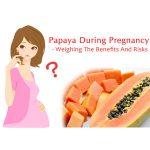
While some foods may be healthy for you during pregnancy, others might be unhealthy. Hence, if you wish to know if eating papaya during pregnancy is safe for you, this post is for you.Papaya is high in nutrients and is known to promote digestive health, but most pregnant women are unsure whether or not to add papaya into their maternal diet. In this post, we discuss the safety, benefits, and side effects of eating papaya when pregnant. Read on.[mj-toc]
Key Pointers
- Consuming moderate amounts of fully ripe papaya during pregnancy is generally considered safe.
- Ripe papaya is high in nutrients such as antioxidants, vitamins, minerals, iron, and folic acid.
- Raw papaya is not advisable for consumption during pregnancy as it contains latex, which may adversely affect fetal health, cause uterine contractions, bleeding, and pregnancy loss.
- Papaya should be avoided during pregnancy under certain conditions, such as allergies to latex, infertility treatment, and history of miscarriages or abortions.
Is It Safe To Eat Papaya During Pregnancy?
Papaya may be one of your prenatal food cravings and you’re wondering if you can consume it. The answer is yes, it is safe as long as you are consuming ripe papaya in moderate quantities. But semi-ripe and unripe papaya may cause complications in pregnant women. Raw papaya is high in latex, a substance responsible for uterine contractions (1). Hence, doctors do not recommend consuming the green fruit as it may lead to adverse effects on expecting mothers.You should be careful about what you are eating during pregnancy, especially in the first and third trimester as these are considered crucial stages.Hannah Whittaker, a pediatric and pregnancy dietitian from Liverpool, England, says, “There is varying evidence to state that unripened papaya may cause uterine contractions; therefore, I would not recommend raw papaya throughout pregnancy. However, ripened papaya can be eaten in moderation.”
Can Papaya Cause Miscarriage In Early Pregnancy?
[caption id="attachment_886908" align="alignnone" width="720"]

Can You Have Papaya In Pregnancy Third Trimester?
Avoid raw papaya in the third trimester. The latex in it could stimulate hormones responsible for contractions. Furthermore, eating green papaya might lead to hemorrhaging and bleeding from the corners of the placenta (2). Therefore, unripe papaya is not recommended during the last months of pregnancy.
Why Should You Avoid Latex In Papaya?
[caption id="attachment_886905" align="alignnone" width="720"]

- The enzyme papain is known to stimulate contractions that can cause abortion (4). Also, it hinders the production of [simple_tooltip text="progesterone" tooltip="Hormone produced in the ovaries that plays a vital role in pregnancy. " ]hormone, which is significant for a healthy pregnancy.
- Latex acts like [simple_tooltip text="oxytocin" tooltip="Hormone that facilitates childbirth." ] and [simple_tooltip text="prostaglandin" tooltip="Physiologically active substance that encourages the cervix to soften and stretch in preparation for childbirth." ], the hormones that could start labor (5).
Latex is found in unripe and semi-ripe papaya, and also in the leaves of the fruit. Hence, try to avoid unripe or semi-ripe papaya throughout your pregnancy.But the proportion of latex diminishes as the fruit ripens and hence, the ripe fruit can be eaten to enjoy its goodness.
Nutrients In Papaya (Ripe)
The ripe papayas are rich nutrients, including:
- Antioxidants such as vitamin A carotenoids
- Minerals such as potassium (6)
- Vitamins
- Iron
- Calories
- Folic acid (7) Although ripe papaya is good for pregnancy, there are conditions when you should avoid it.
A blogger from China opines, “When we visit Mexico, my Mexican mom often gives us a fruit shake, orangish, and with, from my opinion, a little bit funny smell. I grew up in central China and had never eaten papaya before I went to Mexico. I have to admit that I didn't really like too much of its taste and had to drink it totally for politeness. But I was told it is a really healthy fruit, so I did some research on it, and it turns out to be true: papaya is a power food, and you should eat it. I have been getting more used to the flavor: sweet, juicy, and it is not all that bad (i).”[mj_protip type="Quick fact" title="Quick fact"]Papaya juice in moderate quantities may help prevent heartburn during pregnancy (6).[/mj_protip]
When Not To Eat Papaya During Pregnancy?
The doctor may advise you not to consume the fruit during pregnancy, if:
- you have allergies to latex (8)
- you have gone through any infertility treatment and are conceiving after a long time
- you had a miscarriage, abortion, premature delivery, or such concerns previously.
Also, as mentioned earlier, you should avoid raw papaya as it might lead to some adverse effects.
Effects Of Eating Papaya During Pregnancy
Unripe and semi-ripe papayas are not recommended for pregnant women due to potential risks to maternal health for the following reasons.
- Can be harmful to the fetus development: [simple_tooltip text="Teratogenic" tooltip="Chemicals, drugs, or infections that cause defects in the embryo. " ] enzymes can be harmful for fetal development. And papaya contains two of them - chymopapain and papain. Women having a history of miscarriages and abortions should stay away from unripe papaya.[caption id="attachment_886909" align="alignnone" width="720"]

- May cause edema: Eating several pieces of raw papaya regularly may cause edema (1), which means fluid retention in the body. This, in turn, exerts pressure on the blood vessels and might even slow down the process of blood circulation. More pressure could result in internal hemorrhage and affect the embryo.
- A risk of kidney stones: Papaya, a rich source of vitamin C during pregnancy, can lead to the formation of [simple_tooltip text="kidney stones" tooltip="Hard deposits in the kidneys formed by chemicals in the urine." ] when eaten in excess amounts. This may result in stomach cramps that are not good for pregnant women and the baby (9).[caption id="attachment_886903" align="alignnone" width="720"]

- Can weaken the fetal membranes: The papain content in papaya could weaken the membranes of the fetus. This might slow down the development of cells and tissues of the fetus, affecting its health (10).
- Exerts pressure on the stomach: The presence of latex in unripe and semi-ripe papaya can trigger [simple_tooltip text="uterine contractions" tooltip="Tightening and relaxing of uterus muscles." ]. Papaya is also considered a potent [simple_tooltip text="emmenagogue" tooltip="A herb or substance that stimulates menstrual flow." ], which leads to miscarriage. The fiber content in papaya might exert pressure on intestines and stomach (11).
- Produces estrogen: An imbalance of hormones is common during pregnancy. The papain helps in regularizing the menstrual cycle. But during pregnancy, it can increase the temperature of the body, leading to bleeding.
In the next section, we answer a few more queries on papaya during pregnancy.
Frequently Asked Questions
1. Is cooked papaya safe during pregnancy?As long as you are cooking a fully ripe papaya, it is safe to consume. Avoid unripe and semi-ripe papayas, even when cooked.2. Can I drink papaya juice during pregnancy?Juice made with raw papaya should be avoided (1). However, fresh papaya juice with the ripe fruit can be one of the healthy juices to drink during pregnancy, in moderation.3. Can I have papaya milkshake during pregnancy?Yes, if you are using the fresh pulp of the ripe fruit. A fresh papaya milkshake made with the fruit pulp, honey, and milk can be a good source of nutrition.4. Is papaya good for normal delivery?“I wouldn't support the statement that papaya is good for normal delivery and suggest that if eating papaya in pregnancy, ensure your consumption is not excessive. Include it as part of a healthy balanced diet,” Whittaker recommends.5. Can papaya help with anemia during pregnancy?Consuming papaya during pregnancy may be beneficial in treating anemia. A study showed that papaya, in combination with iron supplements, was effective in increasing hemoglobin levels (14).6. Can papaya help with high blood pressure during pregnancy?Papaya, due to its potassium content, may have anti-hypertensive properties. A study showed that papaya effectively reduced the blood pressure of hypertensive patients (15).7. Can papaya help with skin problems during pregnancy?Several studies have shown that the antioxidant properties of papaya may contribute to its anti-aging and wound-healing abilities, thus promoting skin health (16).8. Can papaya help with gestational diabetes during pregnancy?Studies have shown that papaya may be effective in combating diabetes. Papaya, in multiple forms, was tested in diabetic-induced rats and was found to be effective in reducing blood glucose levels (16). However, you may need other medications and dietary and lifestyle changes to manage gestational diabetes properly.Ripe papayas offer several nutrients; therefore, eating them in moderation during pregnancy is beneficial. However, doctors suggest avoiding raw or semi-ripe papaya because they contain latex, which may induce abortion or early labor. Also, those likely to have an abortion, miscarriage, or are undergoing infertility treatment should not eat papaya because it may cause edema, weak fetal membranes, and other issues. If you have any of these issues, papaya may not be one of the best fruits to eat during pregnancy. If you have any doubts about eating papaya during pregnancy, you may take the advice of your healthcare provider.Infographic: Possible Complications Of Unripe Papaya During Pregnancy
You must be mindful of what you consume during pregnancy and its effect on the developing fetus. And on the list of foods that might lead to possible complications is papaya. In the following infographic, we have listed the difficulties that might occur due to consuming unripe or semi-ripe papayas. So read on and keep the list handy. [mj_Infographic title="Infographic: Possible Complications Of Unripe Papaya During Pregnancy" image_url="https://www.momjunction.com/wp-content/uploads/2025/12/Effects-Of-Eating-Papaya-During-Pregnancy.jpg" alt="effects of eating papaya during pregnancy (infographic)"][Illustration_image image_url="https://www.momjunction.com/wp-content/uploads/static-content/illustration_images/papaya_during_pregnancy_does_it_cause_miscarriage_illustration.jpg" alt_txt="Papaya During Pregnancy" image_title="Papaya During Pregnancy: Does It Cause Miscarriage?" image_credit="Stable Diffusion/MomJunction Design Team"][youtube id="309piS2Pfr4"]
Personal Experience: Source
i. Power food: Papaya;https://healthnotes123.blogspot.com/2012/09/power-food-papaya.htmlReferences
1. Adebiyi A, Adaikan PG, & Pasad RN; Papaya (Carica papaya) consumption is unsafe in pregnancy: fact or fable? Scientific evaluation of a common belief in some parts of Asia using a rat model; The British Journal of Nutrition (2002) 2. Aravind. G, Debjit Bhowmik, Duraivel. S & Harish. G; traditional and medicinal uses of carica papaya; Journal of Medicinal Plants Studies 3. L.G. Silva, O. Garcia, M.T.P. Lopes, & C.E. Salas; Changes in protein profile during coagulation of latex from Carica papaya; Brazilian Journal of Medical and Biological Research (1997) 4. Meera Sumanth and Ugendra K. Effect of unripe carica papaya on uterus. Int J Res. Ayurveda Pharm (2013) 5. Chaganti Nagesh, et al.; (2025)'Effect of Carica papaya raw fruit extract using in vitro rat uterus preparations; Asian Journal Of Medical Sciences 6. Common discomforts during pregnancy; UNM Health Sciences Center 7. Philippines: The fruit that heals; International Tropical Fruits Network 8. Ogbodo S. O., Okaka A. N. C., Nwagha U. I., Ejezie F. E., Free Radicals and Antioxidants Status in Pregnancy: Need for Pre- and Early Pregnancy Assessment, American Journal of Medicine and Medical Sciences, Vol. 4 No. 6, 2014, pp. 230-235. doi: 10.5923/j.ajmms.20140406.06. 9. Dr. Neethu S Kumar, Sreeja Devi PS; The surprising health benefits of papaya seeds: A review; Journal of Pharmacognosy and Phytochemistry 10. Sumana Reddy; Latex Allergy; American Academy of Family Physicians (1998) 11. 5 Common Myths About Kidney Disease Prevention; National Kidney Foundation 12. Tarun Vij & Yash Prashar; A review on medicinal properties of Carica papaya Linn, Asian Pacific Journal of Tropical Disease (2015) 13. K L Krishna, M Paridhavi, & Jagruti A Patel; Review on nutrition, medicinal and pharmacological properties of Papaya (Carica papaya Linn.); JSS College of Pharmacy, Rajiv Gandhi Institute of Pharmacy, Nirma University of Science & Technology (2008) 14. Cut Nurhasanah et al.;The Effectively of Papaya Consumption (Carica papaya Linn.), Vitamin C, and Fe Tablets in Improving Hemoglobin Levels for Adolescent Girls with Anemia in Polytechnic of Health-Ministry of Health, Aceh; Open Access Maced J Med Sci (2025) 15. Achmad Wahdi et al.;The Effectiveness of Giving Papaya Fruit (Carica Papaya) Toward Blood Pressure on Elderly Hypertension Patients; IOP Conference Series: Earth and Environmental Science (2025) 16. Yew Rong Kong et al.;Beneficial Role of Carica papaya Extracts and Phytochemicals on Oxidative Stress and Related Diseases: A Mini Review; Biology (Basel) (2025)While some foods may be healthy for you during pregnancy, others might be unhealthy. Hence, if you wish to know if eating papaya during pregnancy is safe for you, this post is for you.Papaya is high in nutrients and is known to promote digestive health, but most pregnant women are unsure whether or not to add papaya into their maternal diet. In this post, we discuss the safety, benefits, and side effects of eating papaya when pregnant. Read on.[mj-toc]
Key Pointers
- Consuming moderate amounts of fully ripe papaya during pregnancy is generally considered safe.
- Ripe papaya is high in nutrients such as antioxidants, vitamins, minerals, iron, and folic acid.
- Raw papaya is not advisable for consumption during pregnancy as it contains latex, which may adversely affect fetal health, cause uterine contractions, bleeding, and pregnancy loss.
- Papaya should be avoided during pregnancy under certain conditions, such as allergies to latex, infertility treatment, and history of miscarriages or abortions.
Is It Safe To Eat Papaya During Pregnancy?
Papaya may be one of your prenatal food cravings and you’re wondering if you can consume it. The answer is yes, it is safe as long as you are consuming ripe papaya in moderate quantities. But semi-ripe and unripe papaya may cause complications in pregnant women. Raw papaya is high in latex, a substance responsible for uterine contractions (1). Hence, doctors do not recommend consuming the green fruit as it may lead to adverse effects on expecting mothers.You should be careful about what you are eating during pregnancy, especially in the first and third trimester as these are considered crucial stages.Hannah Whittaker, a pediatric and pregnancy dietitian from Liverpool, England, says, “There is varying evidence to state that unripened papaya may cause uterine contractions; therefore, I would not recommend raw papaya throughout pregnancy. However, ripened papaya can be eaten in moderation.”
Can Papaya Cause Miscarriage In Early Pregnancy?
[caption id="attachment_886908" align="alignnone" width="720"]

Can You Have Papaya In Pregnancy Third Trimester?
Avoid raw papaya in the third trimester. The latex in it could stimulate hormones responsible for contractions. Furthermore, eating green papaya might lead to hemorrhaging and bleeding from the corners of the placenta (2). Therefore, unripe papaya is not recommended during the last months of pregnancy.
Why Should You Avoid Latex In Papaya?
[caption id="attachment_886905" align="alignnone" width="720"]

- The enzyme papain is known to stimulate contractions that can cause abortion (4). Also, it hinders the production of [simple_tooltip text="progesterone" tooltip="Hormone produced in the ovaries that plays a vital role in pregnancy. " ]hormone, which is significant for a healthy pregnancy.
- Latex acts like [simple_tooltip text="oxytocin" tooltip="Hormone that facilitates childbirth." ] and [simple_tooltip text="prostaglandin" tooltip="Physiologically active substance that encourages the cervix to soften and stretch in preparation for childbirth." ], the hormones that could start labor (5).
Latex is found in unripe and semi-ripe papaya, and also in the leaves of the fruit. Hence, try to avoid unripe or semi-ripe papaya throughout your pregnancy.But the proportion of latex diminishes as the fruit ripens and hence, the ripe fruit can be eaten to enjoy its goodness.
Nutrients In Papaya (Ripe)
The ripe papayas are rich nutrients, including:
- Antioxidants such as vitamin A carotenoids
- Minerals such as potassium (6)
- Vitamins
- Iron
- Calories
- Folic acid (7) Although ripe papaya is good for pregnancy, there are conditions when you should avoid it.
A blogger from China opines, “When we visit Mexico, my Mexican mom often gives us a fruit shake, orangish, and with, from my opinion, a little bit funny smell. I grew up in central China and had never eaten papaya before I went to Mexico. I have to admit that I didn't really like too much of its taste and had to drink it totally for politeness. But I was told it is a really healthy fruit, so I did some research on it, and it turns out to be true: papaya is a power food, and you should eat it. I have been getting more used to the flavor: sweet, juicy, and it is not all that bad (i).”[mj_protip type="Quick fact" title="Quick fact"]Papaya juice in moderate quantities may help prevent heartburn during pregnancy (6).[/mj_protip]
When Not To Eat Papaya During Pregnancy?
The doctor may advise you not to consume the fruit during pregnancy, if:
- you have allergies to latex (8)
- you have gone through any infertility treatment and are conceiving after a long time
- you had a miscarriage, abortion, premature delivery, or such concerns previously.
Also, as mentioned earlier, you should avoid raw papaya as it might lead to some adverse effects.
Effects Of Eating Papaya During Pregnancy
Unripe and semi-ripe papayas are not recommended for pregnant women due to potential risks to maternal health for the following reasons.
- Can be harmful to the fetus development: [simple_tooltip text="Teratogenic" tooltip="Chemicals, drugs, or infections that cause defects in the embryo. " ] enzymes can be harmful for fetal development. And papaya contains two of them - chymopapain and papain. Women having a history of miscarriages and abortions should stay away from unripe papaya.[caption id="attachment_886909" align="alignnone" width="720"]

- May cause edema: Eating several pieces of raw papaya regularly may cause edema (1), which means fluid retention in the body. This, in turn, exerts pressure on the blood vessels and might even slow down the process of blood circulation. More pressure could result in internal hemorrhage and affect the embryo.
- A risk of kidney stones: Papaya, a rich source of vitamin C during pregnancy, can lead to the formation of [simple_tooltip text="kidney stones" tooltip="Hard deposits in the kidneys formed by chemicals in the urine." ] when eaten in excess amounts. This may result in stomach cramps that are not good for pregnant women and the baby (9).[caption id="attachment_886903" align="alignnone" width="720"]

- Can weaken the fetal membranes: The papain content in papaya could weaken the membranes of the fetus. This might slow down the development of cells and tissues of the fetus, affecting its health (10).
- Exerts pressure on the stomach: The presence of latex in unripe and semi-ripe papaya can trigger [simple_tooltip text="uterine contractions" tooltip="Tightening and relaxing of uterus muscles." ]. Papaya is also considered a potent [simple_tooltip text="emmenagogue" tooltip="A herb or substance that stimulates menstrual flow." ], which leads to miscarriage. The fiber content in papaya might exert pressure on intestines and stomach (11).
- Produces estrogen: An imbalance of hormones is common during pregnancy. The papain helps in regularizing the menstrual cycle. But during pregnancy, it can increase the temperature of the body, leading to bleeding.
In the next section, we answer a few more queries on papaya during pregnancy.
Frequently Asked Questions
1. Is cooked papaya safe during pregnancy?As long as you are cooking a fully ripe papaya, it is safe to consume. Avoid unripe and semi-ripe papayas, even when cooked.2. Can I drink papaya juice during pregnancy?Juice made with raw papaya should be avoided (1). However, fresh papaya juice with the ripe fruit can be one of the healthy juices to drink during pregnancy, in moderation.3. Can I have papaya milkshake during pregnancy?Yes, if you are using the fresh pulp of the ripe fruit. A fresh papaya milkshake made with the fruit pulp, honey, and milk can be a good source of nutrition.4. Is papaya good for normal delivery?“I wouldn't support the statement that papaya is good for normal delivery and suggest that if eating papaya in pregnancy, ensure your consumption is not excessive. Include it as part of a healthy balanced diet,” Whittaker recommends.5. Can papaya help with anemia during pregnancy?Consuming papaya during pregnancy may be beneficial in treating anemia. A study showed that papaya, in combination with iron supplements, was effective in increasing hemoglobin levels (14).6. Can papaya help with high blood pressure during pregnancy?Papaya, due to its potassium content, may have anti-hypertensive properties. A study showed that papaya effectively reduced the blood pressure of hypertensive patients (15).7. Can papaya help with skin problems during pregnancy?Several studies have shown that the antioxidant properties of papaya may contribute to its anti-aging and wound-healing abilities, thus promoting skin health (16).8. Can papaya help with gestational diabetes during pregnancy?Studies have shown that papaya may be effective in combating diabetes. Papaya, in multiple forms, was tested in diabetic-induced rats and was found to be effective in reducing blood glucose levels (16). However, you may need other medications and dietary and lifestyle changes to manage gestational diabetes properly.Ripe papayas offer several nutrients; therefore, eating them in moderation during pregnancy is beneficial. However, doctors suggest avoiding raw or semi-ripe papaya because they contain latex, which may induce abortion or early labor. Also, those likely to have an abortion, miscarriage, or are undergoing infertility treatment should not eat papaya because it may cause edema, weak fetal membranes, and other issues. If you have any of these issues, papaya may not be one of the best fruits to eat during pregnancy. If you have any doubts about eating papaya during pregnancy, you may take the advice of your healthcare provider.Infographic: Possible Complications Of Unripe Papaya During Pregnancy
You must be mindful of what you consume during pregnancy and its effect on the developing fetus. And on the list of foods that might lead to possible complications is papaya. In the following infographic, we have listed the difficulties that might occur due to consuming unripe or semi-ripe papayas. So read on and keep the list handy. [mj_Infographic title="Infographic: Possible Complications Of Unripe Papaya During Pregnancy" image_url="https://www.momjunction.com/wp-content/uploads/2025/12/Effects-Of-Eating-Papaya-During-Pregnancy.jpg" alt="effects of eating papaya during pregnancy (infographic)"][Illustration_image image_url="https://www.momjunction.com/wp-content/uploads/static-content/illustration_images/papaya_during_pregnancy_does_it_cause_miscarriage_illustration.jpg" alt_txt="Papaya During Pregnancy" image_title="Papaya During Pregnancy: Does It Cause Miscarriage?" image_credit="Stable Diffusion/MomJunction Design Team"][youtube id="309piS2Pfr4"]
Personal Experience: Source
i. Power food: Papaya;https://healthnotes123.blogspot.com/2012/09/power-food-papaya.htmlReferences
1. Adebiyi A, Adaikan PG, & Pasad RN; Papaya (Carica papaya) consumption is unsafe in pregnancy: fact or fable? Scientific evaluation of a common belief in some parts of Asia using a rat model; The British Journal of Nutrition (2002) 2. Aravind. G, Debjit Bhowmik, Duraivel. S & Harish. G; traditional and medicinal uses of carica papaya; Journal of Medicinal Plants Studies 3. L.G. Silva, O. Garcia, M.T.P. Lopes, & C.E. Salas; Changes in protein profile during coagulation of latex from Carica papaya; Brazilian Journal of Medical and Biological Research (1997) 4. Meera Sumanth and Ugendra K. Effect of unripe carica papaya on uterus. Int J Res. Ayurveda Pharm (2013) 5. Chaganti Nagesh, et al.; (2025)'Effect of Carica papaya raw fruit extract using in vitro rat uterus preparations; Asian Journal Of Medical Sciences 6. Common discomforts during pregnancy; UNM Health Sciences Center 7. Philippines: The fruit that heals; International Tropical Fruits Network 8. Ogbodo S. O., Okaka A. N. C., Nwagha U. I., Ejezie F. E., Free Radicals and Antioxidants Status in Pregnancy: Need for Pre- and Early Pregnancy Assessment, American Journal of Medicine and Medical Sciences, Vol. 4 No. 6, 2014, pp. 230-235. doi: 10.5923/j.ajmms.20140406.06. 9. Dr. Neethu S Kumar, Sreeja Devi PS; The surprising health benefits of papaya seeds: A review; Journal of Pharmacognosy and Phytochemistry 10. Sumana Reddy; Latex Allergy; American Academy of Family Physicians (1998) 11. 5 Common Myths About Kidney Disease Prevention; National Kidney Foundation 12. Tarun Vij & Yash Prashar; A review on medicinal properties of Carica papaya Linn, Asian Pacific Journal of Tropical Disease (2015) 13. K L Krishna, M Paridhavi, & Jagruti A Patel; Review on nutrition, medicinal and pharmacological properties of Papaya (Carica papaya Linn.); JSS College of Pharmacy, Rajiv Gandhi Institute of Pharmacy, Nirma University of Science & Technology (2008) 14. Cut Nurhasanah et al.;The Effectively of Papaya Consumption (Carica papaya Linn.), Vitamin C, and Fe Tablets in Improving Hemoglobin Levels for Adolescent Girls with Anemia in Polytechnic of Health-Ministry of Health, Aceh; Open Access Maced J Med Sci (2025) 15. Achmad Wahdi et al.;The Effectiveness of Giving Papaya Fruit (Carica Papaya) Toward Blood Pressure on Elderly Hypertension Patients; IOP Conference Series: Earth and Environmental Science (2025) 16. Yew Rong Kong et al.;Beneficial Role of Carica papaya Extracts and Phytochemicals on Oxidative Stress and Related Diseases: A Mini Review; Biology (Basel) (2025)
Read full bio of Swati Patwal
Read full bio of Rebecca Malachi
Read full bio of Aneesha Amonz





